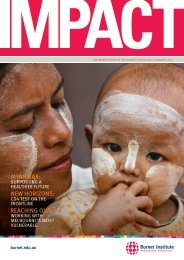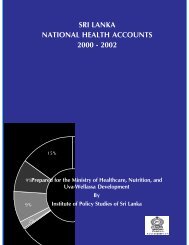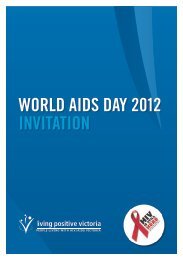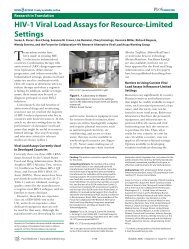Illicit Drug use in the Asia Pacific Region - Burnet Institute
Illicit Drug use in the Asia Pacific Region - Burnet Institute
Illicit Drug use in the Asia Pacific Region - Burnet Institute
Create successful ePaper yourself
Turn your PDF publications into a flip-book with our unique Google optimized e-Paper software.
Situational analysis of illicit drug issues and responses <strong>in</strong> <strong>the</strong> <strong>Asia</strong>–<strong>Pacific</strong> region<br />
308<br />
A14 .5 Country responses to drugs<br />
Convention adherence<br />
Fiji and Tonga are party to all three <strong>in</strong>ternational<br />
conventions, while Samoa and<br />
Vanuatu are not party to any of <strong>the</strong> conventions<br />
. The Solomon Islands has ratified<br />
only <strong>the</strong> 1961 Convention on Narcotics <strong>Drug</strong>s .<br />
Papua New Gu<strong>in</strong>ea has ratified <strong>the</strong> 1961 and<br />
1971 Conventions and adherence to <strong>the</strong> 1988<br />
Convention is under discussion .<br />
Policy responses<br />
The identification of key organisations<br />
<strong>in</strong>volved <strong>in</strong> policy and illicit drug-related<br />
<strong>in</strong>itiatives was undertaken through a consultation<br />
process with key <strong>in</strong>formants .<br />
<strong>Region</strong>al and country structures<br />
<strong>Pacific</strong> Islands key policy and law enforcement<br />
activities are conducted through <strong>the</strong> <strong>Pacific</strong><br />
Islands Forum Secretariat at a regional level .<br />
The Secretariat of <strong>the</strong> <strong>Pacific</strong> Community<br />
(SPC) has a regional public health role .<br />
In Fiji, <strong>the</strong> National Substance Ab<strong>use</strong> Advisory<br />
Council (NSAAC), established <strong>in</strong> 1999 and<br />
organised under <strong>the</strong> M<strong>in</strong>istry of Education,<br />
foc<strong>use</strong>s on promot<strong>in</strong>g a healthy lifestyle and<br />
safe dr<strong>in</strong>k<strong>in</strong>g practices, while promot<strong>in</strong>g<br />
actions and advice to m<strong>in</strong>imise social and<br />
economic harm result<strong>in</strong>g from alcohol or substance<br />
ab<strong>use</strong> <strong>in</strong> schools or <strong>the</strong> community .<br />
In Papua New Gu<strong>in</strong>ea, <strong>the</strong> National Narcotics<br />
Control Board is <strong>the</strong> central government unit<br />
responsible for liaison and coord<strong>in</strong>ation of drug<br />
control policy . The National Narcotics Control<br />
Board coord<strong>in</strong>ates activities of anti-drug<br />
organisations, churches, schools, and <strong>the</strong> com-<br />
munity . Its secretariat, <strong>the</strong> National Narcotics<br />
Bureau, is responsible, among o<strong>the</strong>r th<strong>in</strong>gs, for<br />
<strong>the</strong> conduct of surveys and <strong>the</strong> collation and<br />
evaluation of <strong>in</strong>formation on consumption,<br />
traffick<strong>in</strong>g and manufacture of drugs and<br />
convictions for drug-related offences . There<br />
is no government authority mandated with<br />
<strong>the</strong> responsibility for precursors .<br />
The M<strong>in</strong>istries or Departments of Health <strong>in</strong><br />
island nations such as Samoa, Papua New<br />
Gu<strong>in</strong>ea and Fiji are responsible for <strong>the</strong> licit<br />
control of narcotic drugs and psychotropic<br />
substances .<br />
Comb<strong>in</strong>ed Law Agencies (CLAGs) are crafted<br />
as a response to <strong>the</strong> new trends <strong>in</strong> organised<br />
crime which pose considerable challenges . The<br />
CLAG is developed to facilitate <strong>in</strong>ter-agency<br />
cooperation and belongs equally to all agencies<br />
participat<strong>in</strong>g . CLAGs are currently be<strong>in</strong>g<br />
established <strong>in</strong> Samao, <strong>the</strong> Solomon Islands<br />
and Vanuatu .<br />
<strong>Region</strong>al drug control policy<br />
Presently, <strong>the</strong>re is no overall regional or country-based<br />
drug policy <strong>in</strong> <strong>the</strong> <strong>Pacific</strong> (personal<br />
communication, Forum Secretariat, 2005) .<br />
The <strong>in</strong>ability of current illicit drug legislation<br />
with<strong>in</strong> <strong>the</strong> region to provide a common base<br />
for law enforcement agencies to operate<br />
from at both a national and regional basis<br />
was noted with some concern at a recent<br />
Forum <strong>Region</strong>al Security Committee (FRSC)<br />
meet<strong>in</strong>g (personal communication, Forum<br />
Secretariat, 2005) . Legislation is not keep<strong>in</strong>g<br />
pace with advances <strong>in</strong> technology, such as<br />
access to computers and f<strong>in</strong>ancial records,<br />
<strong>the</strong> <strong>in</strong>ternet, ATS products and <strong>the</strong> issue<br />
of controlled deliveries, and <strong>the</strong>re are no<br />
regionally consistent penalties .<br />
In 2002, a jo<strong>in</strong>t work<strong>in</strong>g group was established<br />
to develop a common approach<br />
across <strong>the</strong> <strong>Pacific</strong> to illicit drug control .<br />
This work<strong>in</strong>g group consists of <strong>the</strong> South<br />
<strong>Pacific</strong> Chiefs of Police Conference (SPCPC),<br />
<strong>the</strong> Oceania Customs Organisation and <strong>the</strong><br />
Forum Secretariat (personal communication,<br />
Forum Secretariat, 2005) .<br />
The work<strong>in</strong>g group has assessed current<br />
legislation and developed new legislation<br />
for illicit drug control . The purpose of <strong>the</strong><br />
Bill (<strong>Illicit</strong> <strong>Drug</strong>s Control Bill draft, 2002) is<br />
to repeal exist<strong>in</strong>g laws and put <strong>in</strong> place laws<br />
address<strong>in</strong>g aspects of illicit drugs trade that<br />
have not o<strong>the</strong>rwise been addressed under<br />
current laws or that require streng<strong>the</strong>n<strong>in</strong>g<br />
to allow for more effective <strong>in</strong>vestigation<br />
and enforcement (personal communication,<br />
Forum Secretariat, 2005) .<br />
Forum Secretariat leaders have signed off<br />
on <strong>the</strong> Bill and endorsed its adaptation to<br />
local environments (personal communication,<br />
Forum Secretariat, 2005) . The Bill calls for<br />
illicit drug legislation to be consistent <strong>in</strong> <strong>the</strong><br />
region with respect to: offences, penalties,<br />
classes of illicit drugs, and <strong>in</strong>vestigation and<br />
enforcement (search, seizure and forfeiture) .<br />
The <strong>Illicit</strong> <strong>Drug</strong>s Control Bill has been <strong>use</strong>d as<br />
<strong>the</strong> basis of legislation <strong>in</strong> Tonga, Fiji and <strong>the</strong><br />
Nor<strong>the</strong>rn Mariana Islands (personal communication,<br />
Forum Secretariat, 2005) . Director of<br />
<strong>the</strong> National Narcotics Bureau, Papua New<br />
Gu<strong>in</strong>ea, reported <strong>in</strong> a press release (Ruahma’a,<br />
2004) that <strong>the</strong> Bill would be brought to<br />
Parliament for approval dur<strong>in</strong>g <strong>the</strong> June 2004<br />
session . More recent <strong>in</strong>formation regard<strong>in</strong>g<br />
<strong>the</strong> progress of <strong>the</strong> Bill <strong>in</strong> Papua New Gu<strong>in</strong>ea<br />
was unable to be obta<strong>in</strong>ed .<br />
Table A14 .5 . Adherence to narcotics treaties by <strong>Pacific</strong> countries<br />
Countries 1961 Convention<br />
on Narcotics <strong>Drug</strong>s<br />
1971 Convention<br />
on Psychotropic<br />
Substances<br />
1988 Convention<br />
aga<strong>in</strong>st <strong>Illicit</strong><br />
Traffick<strong>in</strong>g <strong>in</strong><br />
Narcotic <strong>Drug</strong>s<br />
and Psychotropic<br />
Substances<br />
Fiji + + +<br />
Papua New<br />
+ + –<br />
Gu<strong>in</strong>ea<br />
(under discussion)<br />
Samoa – – –<br />
Solomon<br />
Islands<br />
+ – –<br />
Tonga + + +<br />
Vanuatu – – –<br />
Source: United Nations Office on <strong>Drug</strong>s and Crime, 2003<br />
309<br />
Country profiles: <strong>Pacific</strong> overview









